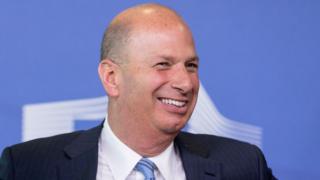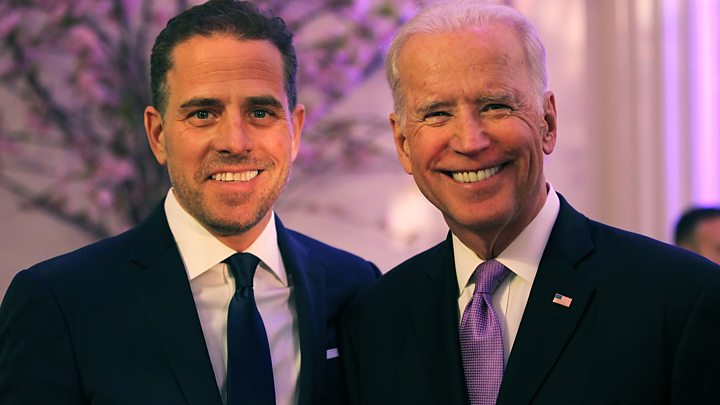 Image copyright
Getty Images
Image copyright
Getty Images
The Trump administration has blocked the US ambassador to the European Union from appearing before a congressional impeachment investigation.
Gordon Sondland was due to meet behind closed doors on Tuesday with staff from three Democratic-led House committees.
The committee chairmen vowed to issue a legal summons to Mr Sondland.
Mr Sondland was set to be grilled about any role he played in prodding Ukraine to investigate President Donald Trump's political rival, Joe Biden.
What's the investigation about?
The Democratic-led inquiry is trying to establish whether the Republican president withheld nearly $400m (£327m) in aid to nudge Ukraine's president into launching an inquiry into Mr Biden, whose son, Hunter Biden, was on the board of a Ukrainian energy company.
In a phone call on 25 July, Mr Trump asked the newly elected Volodymyr Zelensky to scrutinise the former US vice-president, who is a leading Democratic contender for next year's White House election.
A whistleblower raised concerns about the phone call, and the Democratic leader of the House of Representatives, Speaker Nancy Pelosi, announced a formal impeachment investigation last month.
Impeachment is a measure by which Congress can seek to remove a president from office.
How did Sondland explain his no-show?
Mr Sondland said he had been instructed by the Department of State early on Tuesday not to appear for the congressional deposition.
"Ambassador Sondland believes strongly that he acted at all times in the best interests of the United States, and he stands ready to answer the Committee's questions fully and truthfully," said a statement from his lawyer, Robert Luskin.
The attorney said Mr Sondland was "profoundly disappointed" as he had travelled to Washington from Brussels in order to prepare for his appearance.
The political appointee had been due to answer questions on Tuesday from the House foreign affairs, intelligence and oversight committees.
What's the political reaction?
President Trump said Mr Sondland would only have been appearing before a "kangaroo court".
The chairmen of the three committees responded by vowing to fire off a subpoena demanding Mr Sondland's testimony and certain documents.
Intelligence committee chairman Adam Schiff told reporters the envoy has text messages or emails "deeply relevant" to the inquiry on a personal device. He said those communications had been passed to the Department of State, which was withholding them.
"The failure to produce this witness," the California Democrat added, "the failure to produce these documents, we consider yet additional strong evidence of obstruction of the constitutional functions of Congress."
But Jim Jordan, top Republican on the oversight committee, said he understood why the state department had blocked Mr Sondland's appearance, calling the inquiry "unfair and partisan".
Speaking to reporters, Mr Jordan, of Ohio, accused Mr Schiff of "trampling on constitutional considerations and disregarding legitimate concerns about due process and fairness".

Media playback is unsupported on your device
Stalemate
This should just about settle it. The Trump administration is not going to co-operate with the congressional impeachment inquiry. Not at all. Not one bit.
That shouldn't come as a huge surprise, since the president himself has asserted that the entire investigation is illegitimate and the State Department has already objected to its employees testifying before Congress. Instructing EU Ambassador Gordon Sondland to cancel his deposition just hours before he was scheduled to appear, however, is particularly confrontational. It's sure to enflame the already heightened tensions between Congress and the White House.
House Democrats were keen to press Sondland on recently revealed text messages that showed he worked with other administration diplomats to encourage Ukraine to investigate an energy company with ties to Joe Biden's son. They also may have been curious to find out why the Republican-donor-turned-EU-ambassador was even involved in diplomacy with a nation that is not part of the EU.
Now they won't get anything - at least, not from Sondland directly. And while Democrats might cite the administration's obstinance as evidence of obstruction, their goal is a quick and thorough inquiry, not a drawn-out investigatory stalemate.
What did Sondland's texts say?
Text messages made public last week show Mr Sondland discussing with other US diplomats an effort to pressure Ukrainian leaders to investigate Mr Biden.
In one of the texts, Mr Sondland said Mr Trump "really wants the deliverable".
In another exchange, Bill Taylor, the senior US diplomat in Ukraine, questions whether conditions are being attached to US military aid and a White House invitation for Ukraine's president.
Mr Sondland replies that their discussion should be continued over the phone.
Another text shows Mr Taylor saying it would be "crazy" to withhold military aid to Ukraine for Mr Trump's political gain in the 2020 election.
But Mr Sondland firmly pushes back, saying Mr Taylor has misunderstood the president's intentions.
Mr Sondland reportedly sent this last message after a direct call with the president, the Associated Press reported on Tuesday.
Who is Gordon Sondland?
Mr Sondland is a Seattle-based hotelier who donated $1 million to the Republican president's inauguration committee.
He had no diplomatic experience, US media report, before Mr Trump nominated him to his position as ambassador in May.
Despite being a longtime Republican, the 61-year-old once worked on the transition team of the Democratic governor of Oregon in 2003.
In 2016, Mr Sondland was a Jeb Bush supporter and criticised Mr Trump over his anti-illegal immigration stance, though he became a Trump ally after his election win.
Quick facts on impeachment
Impeachment is the first part - the charges - of a two-stage political process by which Congress can remove a president from office
If the House of Representatives votes to pass articles of impeachment, the Senate is forced to hold a trial
A Senate vote requires a two-thirds majority to convict - unlikely in this case, given that Mr Trump's party controls the chamber
Only two US presidents in history - Bill Clinton and Andrew Johnson - have been impeached but neither was convicted and removed
President Nixon resigned before he could have been impeached
